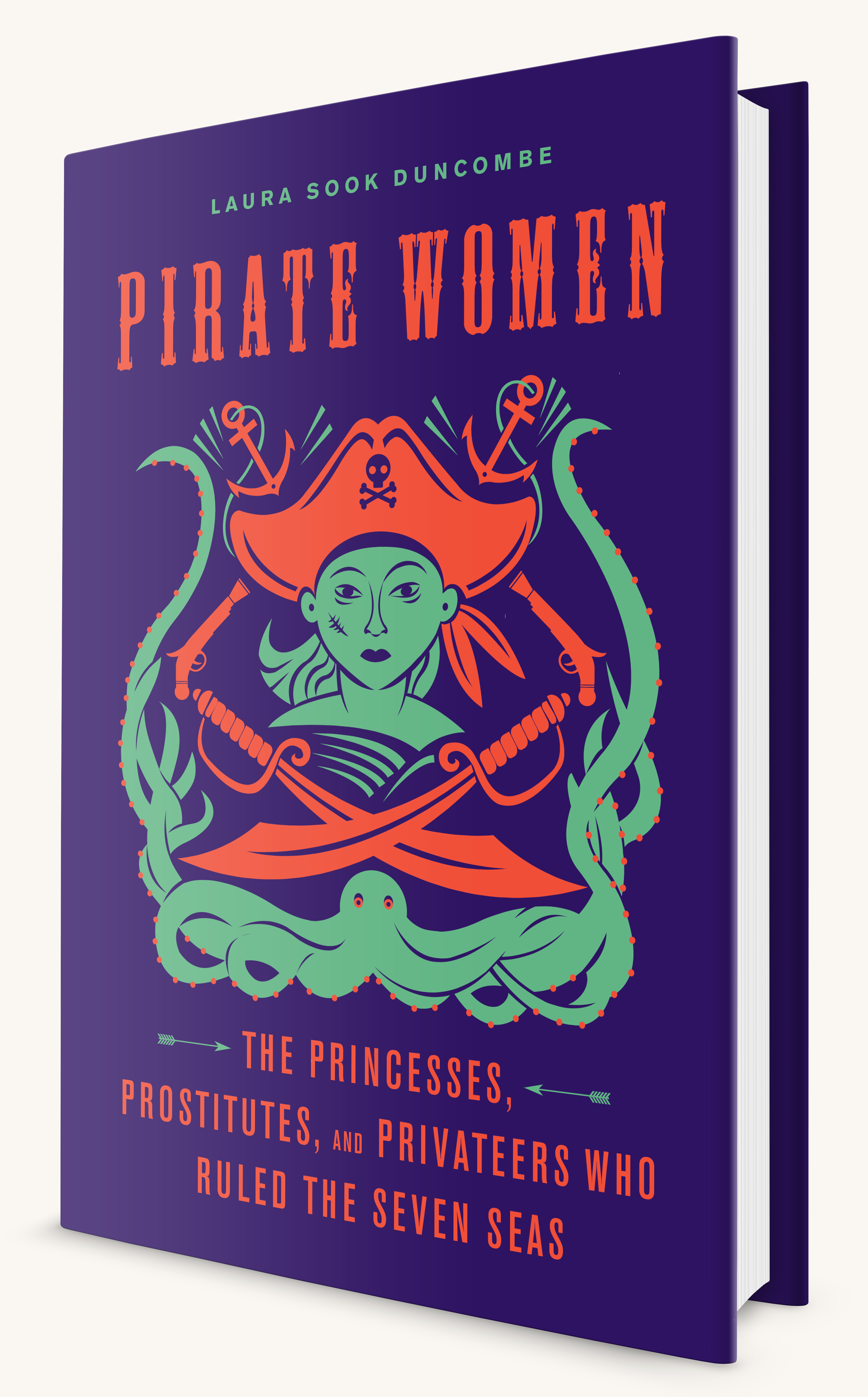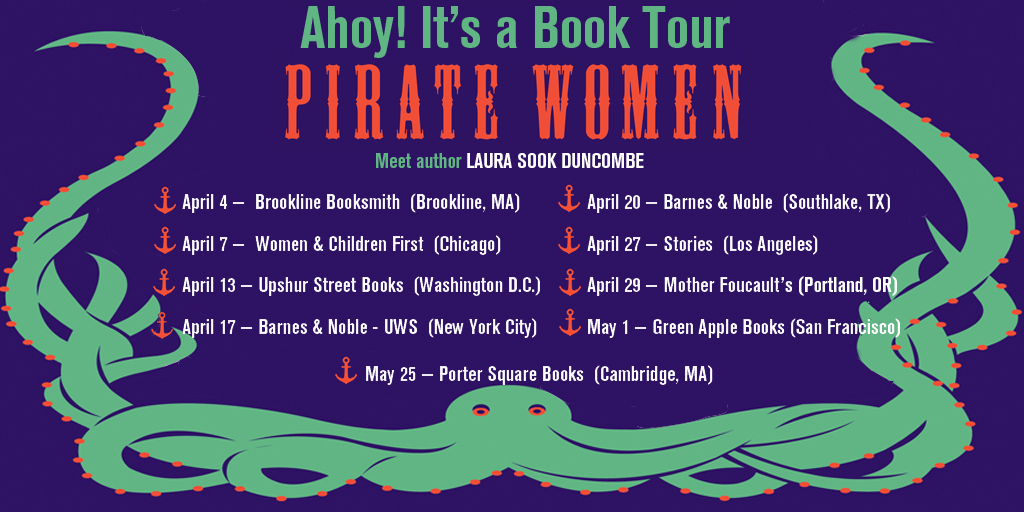
In the first-ever history of female pirates,Laura Sook Duncombe, author of Pirate Women: The Princesses, Prostitutes, and Privateers Who Ruled the Seven Seas, shares stories of adventurous female buccaneers around the world who decided to go against the grain by embarking on their own swashbuckling adventures. Pirate Women includes stories of women from all walks of life; from Grace O’Malley, who terrorized shipping operations around the British Isles during the reign of Queen Elizabeth I, to the earliest known female pirate in the Mediterranean, Queen Artemisia I of Halicarnassus, who plundered Greek and Persian ships around 500 BCE. Duncombe expertly dives into why certain stories were passed down and finally shines a light on the women who have been ignored by historians time and time again.
Have you always had a fascination with pirates? When did you begin researching women pirates?
I have been interested in pirates since I was five years old. My parents took me on the Disney ride Pirates of the Caribbean and that was it! I didn’t start seriously researching them until college though. As I became more aware of the world around me and of my own burgeoning feminism, I started to ask why women weren’t in places where I felt they should be. When I asked about women pirates, it turned out that they were where I thought they should be, and always had been, only people weren’t writing about them!
Your work on women pirates has appeared on Jezebel (Cheng I Sao and Sayyida al-Hurra) Had you always wanted to write a book on the subject, or did the Jezebel articles inspire you to continue researching and writing?
I had never dreamed about writing a book about pirate women—it seemed too good to be true. I was actually trying to sell a YA fiction book and was writing the Jezebel columns on the side when I was approached by my now agent to see if I was interested in writing a book. I considered it for about three seconds before replying YES!
Female pirates are rarely discussed in other pirate books on the market perhaps because they threaten traditional male and female gender roles. Do you see this changing in the future? What can be done to ensure that these stories are shared with future generations?
I really don’t know. On the one hand, I feel like female representation is getting better. You’ve got Rey in Star Wars headlining a multi-billion-dollar franchise, which is huge. But then the presidential election last year really hammered home to me how far women still have to go to be accepted as equals to men. So, I don’t know. I do know that nothing will change if people don’t stand up and fight for it. My goal in writing this book was to push the issue, make it easier for women to stretch the definition of “what it means to be a woman.” The more people who insist that women don’t have to fit inside such a narrowly defined role to legitimately exist, the more other people will start to believe it.
Pirate Women includes stories about women from all walks of life. It also includes stories from all around the world; from ancient Norse princess Alfhild to Cheng I Sao, who commanded a fleet of 400 ships off China in the early 19th century. All of these women came from different cultures, yet they all shared a desire to go against the norm to seek power and independence at sea. What made women pirates decide to sail the Seven Seas to find adventure?
I think all of these women, and I say this in the book, share a desire for freedom. And the sea has always symbolized freedom. I think now you can dream of going to outer space, which is why I think sci-fi is so huge, but that wasn’t even in the cards in, say, Ancient Greece. So the sea was a place where you could literally sail to the end of the earth and fall off. It was a place filled with danger and adventure, and I think these women were all drawn to that—a chance to escape what was known and expected.

What was the best part about writing Pirate Women? Is there a particular story you came across in your research that you especially enjoyed?
Oh man, every part was the best part! I still have to pinch myself when I utter the words “I wrote a book about lady pirates.” I did a lot of my research in the Library of Congress, which is absolutely incredible, but I also had a lot of phone calls and snail-mail exchanges with some tremendous women pirate experts. That might be the best part for me—getting to know some of the amazing women scholars who have come before me. As for a story—I knew zero about the Viking women before I started, and I was particularly moved by both Alfhild and Lagertha’s stories. Alfhild because it’s so tragic, and Lagertha because it’s so hysterical. Something for everyone in the Viking age!
In your introduction, you include a quote from Audre Lorde regarding writing by and about women: “We must each of us recognize our responsibility to seek those words out, to read them and share them and examine them in their pertinence to our lives.” Although your book includes women from different eras and in different circumstances, what do you hope readers will learn from these extraordinary women?
I hope that readers will take away a new respect for women—what it means to be one. When most people, myself included, think of capital-w Women, they think of someone who looks and acts and talks a certain way. Every woman in the book challenges that—and love ’em or hate ’em, you have to admire how much they diverged from the norm. I hope this book inspires readers to think about what divergence like that would look like in their own lives, and gives them the courage to follow that, wherever it leads them.
Laura Sook Duncombe is a lawyer and a writer whose work on women pirates has appeared on Jezebel. Follow her on Twitter at @lauraduncombe1
 For more details on the Pirate Women book tour, visit here.
For more details on the Pirate Women book tour, visit here.
10 Books you have to read in 2017 (Cosmopolitan)
‘Pirate Women’ is an Empowering Look at Badass Women Throughout History (Rebellious Magazine)
The Pirate Women Who Made Blackbeard Look Like a Joke (VICE)
Pirate Women arrived on shelves on April 1, 2017 and is available wherever books and e-books are sold.
No Comments
No comments yet.